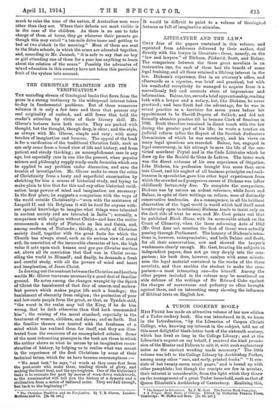THE CHRISTIAN TRADITION AND ITS VERIFICATION.* THE unending stream of
theological books that flows from the press is a strong testimony to the widespread interest taken to-day in fundamental problems. But of these numerous volumes it is only a few here and there that possess any real originality of outlook, and still fewer that hold the reader's attention by virtue of their literary skill. Mr. Glover's lectures have both merits. They are packed with thought, but the thought, though deep, is clear ; and the style, as always with Mr. Glover, simple and racy ; with many touches of imagination and humour. The appeal of the book is for a verification of the traditional Christian faith, such as can only come from a broad view of life and history, and from patient and steady thinking ; an accomplishment rare in any age, but especially rare in one like the present, when popular science and philosophy supply ready-made formulas which can be applied to any problem under discussion, and save the trouble of investigation. Mr. Glover seeks to wean the critic of Christianity from a hasty and superficial examination by sketching for him a course of historical study, and trying to make plain to him that for this and any other historical verifi- cation large powers of mind and imagination are necessary. In the first place, he suggests a comparison with the ways of the world outside Christianity—" even with the assistance of Leopold II. and his Belgians it will be hard for anyone with- out special knowledge to imagine what things were tolerated in ancient society and are tolerated in India "; secondly, a comparison with religion without Christ—and here the writer recommends a study of Plutarch on Isis and Osiris, and, among moderns, of Nietzsche ; thirdly, a study of Christian society itself, together with the great facts for which the Church has always stood, such as its serious view of moral evil, its conviction of the inexorable character of law, the high value it sets upon each human soul pro quo Christ= mortuus eat, above all its conviction that God was in Christ recon- ciling the world to Himself ; and finally, he demands a fresh and careful study, with all the powers of mind and heart and imagination, of Jesus Christ.
In drawing out the contrast between the Christian an d heathen worlds Mr. Glover traverses necessarily a good deal of familiar ground. He notes among the changes wrought by the Spirit of Christ the banishment of that fear of unseen and malevo- lent powers which makes pagan life such a bondage; the banishment of obscenity from religion; the protection of poor and low-caste people from the great, so that, as Tyndale said, "the worst in the realm may tell the King, if he do him wrong, that he doth otherwise than God bath commanded him"; the raising of the moral standard, especially in the treatment of women, children, and slaves; and so forth. But the familiar themes are treated with the freshness of a mind which has realized them for itself, and they are illus- trated from the resources of an accomplished scholar. Some of the most interesting passages in the book are those in which the author shows us what he means by an imaginative recon- struction of history, by helping us to realize what was meant in the experience of the first Christians by some of their technical terms, which for us have become commonplaces :— "We must look," he says, "at words as they come first from the poet-souLs who make them, trailing clouds of glory, and making the heart beat, and the eye brighten. One of the historian's tasks is to recreate the past by means of worn-down watchwords, as the numismatist will tell you the history of a dynasty and a civilisation from a series of battered coins. They are dull enough, but back to the beginning I"
• The Christian Tradition and its Verification. By T. B. Glover. Louden: Xethnen and Co. Ds. 6d. net.]
It would be difficult to point to a volume of theological lectures so full of imaginative stimulus.






































 Previous page
Previous page